For the copy-paste templates, go here.
For specific social content strategies based on your coaching niche, go here.
–
You’re drowning in a sea of social media advice that doesn’t work for coaches. Every “expert” tells you to post daily, use trending hashtags, and chase viral content.
But here’s what they don’t understand about coaching businesses…
What Makes Marketing “Coaching Services” Different
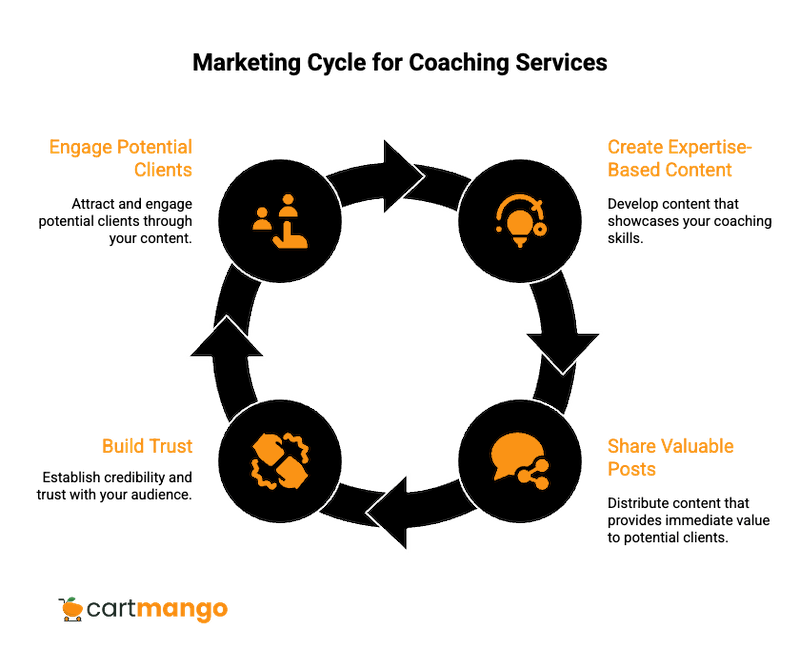
Unlike product-based businesses, we need relationship-focused marketing with longer sales cycles.
Your expertise becomes your content.
Every post showcases your coaching skills while providing immediate value to potential clients. This authentic approach builds trust faster than traditional advertising methods.
Think about it: when someone sees your post about overcoming limiting beliefs, they’re not just reading content. They’re experiencing a mini coaching session.
The Coach Advantage
Most businesses have to convince people they need the product. You get to solve problems in real-time through your posts.
When I share a framework for goal-setting, I’m not just educating my audience. I’m showing them exactly how my mind works and how I approach challenges. Your social media becomes a 24/7 demonstration of your coaching abilities.
People can see your thought processes, your problem-solving methods, and your genuine care for helping others succeed.
Now that you understand what makes social media unique for coaches, let’s discuss how to choose your niche and the best platform to focus on.
The 1-Platform Method for Coaches
Most coaches spread themselves thinner than peanut butter on toast across multiple platforms. Focus on mastering one platform for 3 months based on your strengths and target audience.
Focused effort on a single platform usually yields better results than scattered attempts across multiple channels. You’re not missing out – you’re getting focused.
Specific Strategy for Each of the Top 10 Coaching Niches
Coaching Niche | Required Expertise | Common Pain Points | Client Desired Outcomes | Social Content Focus |
|---|---|---|---|---|
Executive/Leadership | Real leadership experience, business management background | Decision fatigue, team management, work-life balance | Increased productivity, better leadership skills, career advancement | Industry insights, leadership tips, case studies |
Career Transition | Personal career change experience, hiring/recruiting knowledge | Job dissatisfaction, unclear direction, interview anxiety | New career path, salary increase, job satisfaction | Job search tips, industry trends, success stories |
Life Coaching | Personal development journey, overcoming major life challenges | Lack of direction, procrastination, goal-setting | Personal fulfillment, clarity, achievement of goals | Motivational content, personal development, lifestyle |
Health & Wellness | Personal health transformation, practical wellness knowledge | Weight management, low energy, stress | Weight loss, increased energy, healthy habits | Transformation photos, healthy recipes, workout tips |
Financial Coaching | Personal finance success, debt elimination experience, investment knowledge | Debt, poor spending habits, retirement planning | Financial security, debt freedom, wealth building | Money-saving tips, investment advice, debt strategies |
Relationship/Marriage | Successful relationship experience, strong communication skills | Communication issues, trust problems, intimacy | Stronger relationships, better communication, lasting love | Relationship tips, couple exercises, communication skills |
Business/Entrepreneur | Proven business building experience, entrepreneurial success | Revenue plateaus, scaling challenges, time management | Business growth, increased profits, work-life balance | Business strategies, growth tips, entrepreneur stories |
Mindset/Performance | Personal breakthrough experience, performance improvement results | Limiting beliefs, imposter syndrome, fear of failure | Confidence, mental resilience, peak performance | Mindset shifts, success stories, performance tips |
Sales Coaching | Proven sales track record, successful sales experience across industries | Low conversion rates, sales anxiety, lead generation struggles | Increased sales revenue, confident closing, consistent lead flow | Sales techniques, closing strategies, prospecting tips |
Parenting Coaching | Successful parenting experience, child development understanding | Behavioral issues, work-life balance, parenting confidence | Better parent-child relationships, confident parenting, family harmony | Parenting tips, child development, family strategies |
I hope you’re not bouncing between platforms like a pinball machine. LinkedIn one week, Instagram the next, TikTok when you felt adventurous.
Because if you do, I’m pretty sure you’ll get radio silence everywhere.
Choose based on your comfort with content creation and where your target audience is most active. Consider these factors when making your decision.
Nuances of Each Social Platform
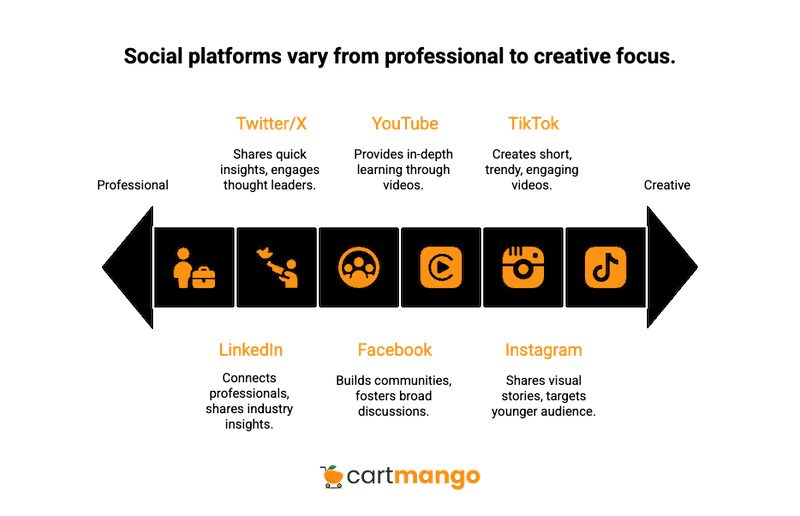
LinkedIn: Professional Network
- Best for: Executive, Career, Business, Financial coaches
- Audience: Working professionals, decision-makers, entrepreneurs
- Content types: Articles, professional insights, industry commentary
- Posting frequency: 2-5 times per week
If you’re coaching people who carry briefcases and drink expensive coffee, LinkedIn is your home base.
Instagram: Visual Storytelling
- Best for: Life, Health, Relationship, Mindset coaches
- Audience: Younger demographics (25-45), lifestyle-focused
- Content types: Photos, Stories, Reels, carousels
- Posting frequency: 3-5 times per week
Facebook: Community Building
- Best for: All coaching niches, community-focused approaches
- Audience: Broad demographics, 30-65 age range
- Content types: Posts, live videos, group discussions
- Posting frequency: 2-4 times per week
YouTube: Educational Authority
- Best for: All niches, educational content focus
- Audience: All demographics seeking in-depth learning
- Content types: Educational videos, tutorials, vlogs
- Posting frequency: 1-2 times per week
Twitter/X: Thought Leadership
- Best for: Business, Executive, Sales coaches
- Audience: Professionals, entrepreneurs, thought leaders
- Content types: Quick insights, threads, real-time commentary
- Posting frequency: 3-5 times per week
TikTok: Creative Content
- Best for: Life, Health, Parenting coaches targeting younger audience
- Audience: Gen Z and younger millennials
- Content types: Short videos, trends, educational content
- Posting frequency: 3-5 times per week
The 3-Month Platform Commitment Rule
Choose one niche and one platform. Commit for 3 months before evaluating these realistic success metrics.
Discovery calls booked from the platform matter more than follower counts. Quality engagement with ideal clients beats viral moments that attract the wrong people.
Maybe you’re thinking three months feels like forever when you’re staring at zero followers. I wanted results yesterday too, but here’s what I learned the hard way:
Platform-hopping kills momentum faster than bad coffee kills morning motivation.
Platform Mastery Focus Areas
Master these elements regardless of platform choice:
- Consistent posting schedule you can maintain long-term
- Daily engagement with your target audience (15-20 minutes)
- Optimized profile with clear value proposition
- Content that addresses your niche’s pain points
- Clear call-to-action in posts and bio
With your niche and platform selected, it’s time to craft content that truly connects and converts.
Content Strategy and Templates
The 40-30-20-10 Content Framework
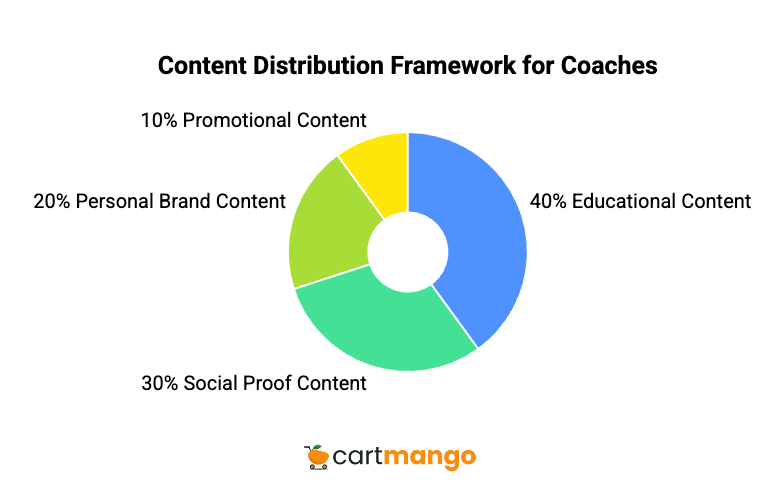
This proven framework helps coaches balance value delivery with business growth.
- Educational content takes up 40% of your posts with actionable tips that showcase expertise.
- Social proof content fills 30% with client success stories that build credibility.
- Personal brand content accounts for 20% with behind-the-scenes material that builds connection.
- Promotional content stays at 10% for services and discovery calls.
I used to wing it completely, posting whatever felt right in the moment, sometimes sharing three client wins in a row then disappearing for weeks.
10 High-Converting Content Templates for Coaches
Template Name | Framework/Structure | Example Opening | Best For Niche | Engagement Goal |
|---|---|---|---|---|
Problem/Solution | Problem → Solution → Question | “Most [target clients] struggle with [specific problem]. Here’s the simple solution I use: [3-step process]. What’s your biggest challenge?” | All niches | Educational engagement |
Client Win Formula | Update → Result → Key insight → CTA | “Client update: [Name] achieved [specific result]. The game-changer was [key insight]. Ready for transformation?” | All niches | Social proof |
Myth-Busting | Myth → Reality → Alternative | “Myth: [Common belief]. Reality: [Truth with explanation]. Try this instead: [Actionable tip].” | All niches | Authority building |
Quick Tip | Tip → Action → Save prompt | “30-second coaching tip: [Specific advice]. Save this and try today.” | All niches | Value delivery |
Behind-Scenes | Story → Learning → Application | “Behind the scenes: [Personal challenge]. Here’s what I learned: [Key insight]. How does this apply to you?” | All niches | Personal connection |
Framework Share | Tool name → Steps → Question | “I use this [framework] with clients: [Step 1, Step 2, Step 3]. Which resonates most?” | All niches | Educational |
Question-Based | Question → Engagement prompt | “Question for my [niche] community: [Thought-provoking question]. Share your thoughts below!” | All niches | Community building |
Transformation | Client → Before/After → Strategy | “Transformation Tuesday: [Client] went from [before] to [after] in [timeframe]. The key was [strategy].” | Health, Life, Business | Social proof |
Mistake Warning | Mistake → Better approach → Recognition | “Common mistake I see: [Wrong approach]. Instead, try: [Better approach]. Sound familiar?” | All niches | Authority/education |
Value List | Number → Tips → Implementation | “[Number] [topic] tips for [target client]: [List with explanations]. Which will you implement first?” | All niches | Educational |
How to Use These Templates
Choose 3-4 templates that feel natural for your communication style and niche. Rotate between them to keep your content fresh while maintaining consistency.
Each template encourages engagement through questions or calls-to-action that start conversations with potential clients. I keep these templates saved in my Notion app. They’re my lifeline when my brain feels completely empty and I’m staring at a blank screen.
Content Creation Reality Check
Plan for 2-3 hours weekly for quality content creation. This includes 60 minutes for content planning and creation using templates above.
Add 30 minutes for scheduling and optimization across your chosen platform. Reserve 60+ minutes for daily engagement and relationship building through comments and DMs.
Maybe you’re thinking that sounds like a mountain of time. Here’s the brutal truth – quality content takes time, but it pays back in ways that cheap, rushed posts never will.
Content Repurposing System
Maximize efficiency by turning one core idea into multiple formats across your platform.
- One main insight becomes a long-form educational post for LinkedIn or Facebook.
- The same idea transforms into a quick tip video or carousel for Instagram and TikTok.
- Save it as story highlights for future reference.
- Turn it into email newsletter content for subscribers.
- Use it as a live session topic for deeper discussion.
The beauty of repurposing is that you’re not starting from scratch every single time. One solid idea can feed your content machine for an entire week.
Niche-Specific Content Adaptations
Adapt these templates based on your coaching niche from the table above.
Executive coaches should use business terminology, corporate case studies, and industry insights.
Life coaches work better with personal stories, lifestyle transformations, and goal achievement content.
Health coaches need visual progress, wellness tips, and transformation stories.
Your niche determines your language. Speaking to burned-out executives requires different words than talking to new moms trying to shed baby weight while juggling toddler tantrums.
Great content is only part of the equation; next, we’ll build a system to turn your followers into paying clients.
Building Your Client Acquisition System
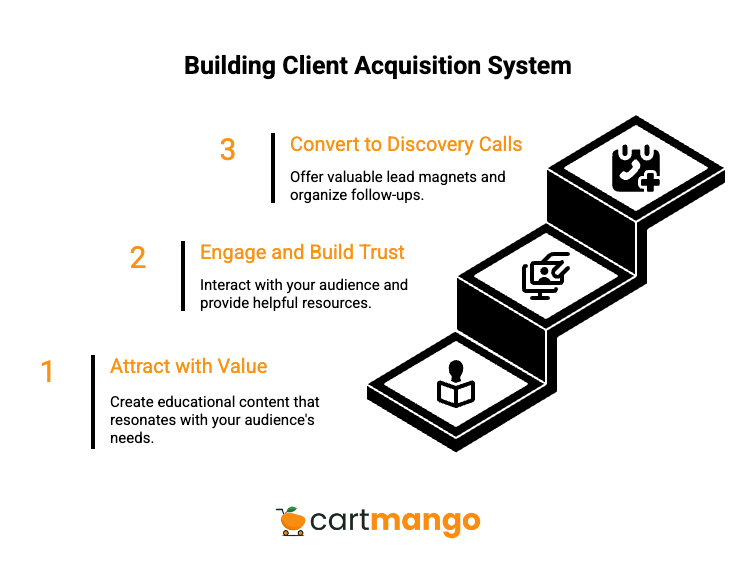
The Social Media to Discovery Call Funnel
Transform social media followers into paying clients through this systematic three-stage approach that builds trust before selling.
People can smell desperation through their phone screens faster than they can detect burnt toast. The coaches who succeed understand that social media is about relationship building, not immediate sales pitches that make people run for the hills.
Stage 1: Attract with Value
Post educational content addressing your niche’s pain points that establish your expertise without being salesy. Focus on solving immediate problems your ideal clients face while demonstrating your coaching methodology.
Your content should make people think, “This person gets it.”
When someone reads your post about overcoming procrastination and thinks, “They’re describing my exact situation,” you’ve hooked them like a fish on a line.
Stage 2: Engage and Build Trust
Respond to comments within 4-6 hours when possible to show you’re accessible. Share helpful resources in DMs without expecting anything in return.
Host monthly live Q&A sessions addressing common questions in your niche. Create polls and questions related to your expertise to encourage interaction.
I learned this lesson by making every mistake in the book. Early in my coaching journey, I’d slide into DMs with sales pitches faster than a teenager asking for gas money. The results were predictably terrible.
Stage 3: Convert to Discovery Calls
This stage focuses on:
- Clear value proposition in bio that explains exactly how you help people.
- Helpful DM conversations that provide value before any sales discussion.
- Valuable lead magnets that solve immediate problems for your niche.
- Simple Google Sheets for organized follow-up and relationship tracking.
Daily Engagement Strategy (Realistic Approach)
Dedicate 15-20 minutes daily to genuine relationship building. Comment meaningfully on 2-3 posts from potential clients in your niche.
Respond thoughtfully to all comments on your content. Send 1-2 helpful DMs to engaged followers who might benefit from your expertise.
This isn’t about hitting some arbitrary number. You’re not trying to comment on 50 posts a day like some engagement robot programmed to spread digital chaos.
Relationship-Building DM Approach
Focus on value-first conversations that build genuine connections.
- Share relevant resources without expecting anything in return.
- Ask thoughtful questions about their specific challenges in your niche.
- Offer genuine help or insights before mentioning your services.
Build trust through consistent helpful interactions over weeks, not days. Only suggest discovery calls after establishing mutual respect and interest.
The best conversations start with you helping someone with zero expectation of return. Those relationships can turn into the most rewarding client partnerships.
You can also ask the questions below…
Niche-Specific Client Understanding Questions
Executive/Leadership Coaches:
- “What’s your biggest leadership challenge right now?”
- “How is work-life balance affecting your team performance?”
Career Transition Coaches:
- “What’s keeping you stuck in your current career situation?”
- “What would your ideal career transition look like in 6 months?”
Life Coaches:
- “What’s keeping you from feeling fulfilled in your current situation?”
- “What would achieving your goals mean for your overall happiness?”
Health & Wellness Coaches:
- “What’s your biggest obstacle to maintaining healthy habits?”
- “How would increased energy change your daily life?”
Financial Coaches:
- “What’s your biggest financial stress right now?”
- “What would financial freedom mean for your lifestyle?”
Relationship/Marriage Coaches:
- “What’s the main communication challenge in your relationship?”
- “What would a thriving relationship look like for you?”
Business/Entrepreneur Coaches:
- “What’s the biggest bottleneck in your business growth?”
- “What would scaling to the next level mean for your freedom?”
Mindset/Performance Coaches:
- “What limiting belief is holding you back most?”
- “What would peak confidence change about your life?”
Sales Coaches:
- “What’s your biggest challenge with closing deals consistently?”
- “What would doubling your sales revenue mean for your business?”
Parenting Coaches:
- “What’s your biggest parenting challenge right now?”
- “What would confident, stress-free parenting look like for your family?”
These questions do more than gather information. They help people clarify their own thoughts and desires while showing you understand their world.
Now that you’re building genuine relationships, let’s see advanced platform features that can amplify these connections.
Advanced Platform Features
Maximizing Your Chosen Platform’s Potential
Once you’ve mastered the basics, it’s time to dive deeper into what makes each of the social media platforms unique. The best social media platform for your coaching business offers specific features that many coaches overlook completely.
Take facebook groups as an example. These aren’t just social media channels for posting random updates. They’re powerful community builders that can transform your coaching practice.
Platform-Specific Power Moves
Your social media efforts should match user behavior on each platform. Instagram functions as a visual platform where motivational quotes and client testimonials perform exceptionally well.
LinkedIn rewards business coaching content and valuable insights that position you as an industry expert. Understanding these nuances helps you create engaging content that resonates with your target audience.
Smart Content Distribution
Don’t limit yourself to basic social media posts. Interactive content like polls and Q&A sessions generate higher engagement rates than standard posts.
Long form content works brilliantly on LinkedIn, while video content dominates Instagram and TikTok. Schedule posts consistently using any reliable marketing tool. This strategic approach keeps you visible without overwhelming your daily routine.
Community Building
Building facebook groups around your coaching philosophy creates a loyal audience that engages regularly. Share industry news, wellness guidance, and actionable strategies that help members solve real problems.
User generated content from your community members serves as powerful social proof. When clients share their wins in your group, it creates authentic testimonials that attract new potential clients.
Expanding Your Reach
Paid ads can help you reach a wider audience when organic growth plateaus. Start small with targeted social media campaigns that highlight your expertise and coaching successes.
Direct message conversations often convert better than public comments. Use direct message to share valuable resources and build genuine relationships with engaged followers.
With these advanced platform strategies in place, next let’s go over how to measure and optimize your expanded efforts.
Analytics and Growth Optimization
Beyond Basic Metrics
Many coaches get stuck measuring follower counts instead of business impact. Analytics tools reveal which specific social media campaigns drive actual discovery calls and client conversions.
Track how different types of social media posts perform across your chosen social media channels. Video content typically generates higher engagement, but long form content often converts better for career coach services.
Advanced Measurement Strategies
Your social media efforts should connect directly to business outcomes. Monitor which engaging content ideas lead to meaningful conversations versus vanity metrics that don’t pay the bills.
Email marketing integration shows the true value of your social media work. Capture email addresses through valuable lead magnets shared across your social channels, then track how these leads convert to clients.
Scaling What Works
Post regularly using the content calendar that balances different engagement levels. Mix quick motivational quotes with deeper wellness guidance that showcases your coaching expertise.
Creating content becomes easier when you understand your audience’s preferences through data. User generated content and client testimonials often outperform even the most polished posts.
Strategic Integration
Your strong presence across chosen social media platforms should reflect consistent coaching philosophy while adapting to each platform’s unique user behavior.
Whether someone discovers you through business coaching content on LinkedIn or finds your career coach guidance on Instagram, they should recognize your distinctive approach.
The most successful coaches treat social media as one integrated marketing tool within their larger business strategy, not as their entire client acquisition system.
To know if your efforts are paying off, you need to measure success with the right metrics.
Measuring Success and ROI
Track these metrics monthly rather than daily to avoid becoming obsessed with short-term fluctuations.
- Discovery calls booked from social media serve as your primary success indicator.
- Meaningful conversations with potential clients measure relationship building progress.
- Profile visits and website clicks indicate interest and reach.
Stop checking your follower count every day like you’re waiting for lottery results.
Honest ROI Expectations
Set realistic timeline expectations based on industry experience.
- Months 1-3 should focus on building relationships and establishing credibility, not immediate ROI.
- Months 4-6 might bring 1-2 discovery calls monthly if you’ve been consistent with valuable content.
- Months 6+ could see 3-5 discovery calls monthly with established presence and trust.
Social media marketing for coaches isn’t a sprint where you cross the finish line gasping for air. You’re planting seeds in fertile soil, not harvesting crops that someone else planted.
The coaches who quit after six weeks never see the relationships they could have built. The ones who stick around for six months start seeing real momentum building beneath their feet.
Monthly Optimization Process
Dedicate 30 minutes monthly to strategic review. Identify your best-performing content types from the template table.
Analyze which topics generate most meaningful engagement from ideal clients. Plan next month’s content themes based on what resonates with your audience.
Adjust strategy based on actual results, not vanity metrics that make you feel good but don’t pay the bills.
Essential Minimalist Tools
Use Google Analytics to track website traffic and demographic insights.
Use Calendly to let people book calls with you.
Use simple spreadsheets like Google Sheets for lead source tracking and keeping track of conversations.
Fancy tools are tempting like shiny objects, but basic tracking works better than no tracking at all.
When to Expand to a Second Platform
Only consider adding a second platform after achieving these benchmarks on your primary platform. Maintain a consistent posting schedule without feeling stressed or overwhelmed.
Regular meaningful conversations with ideal clients should be happening naturally. At least 1-2 discovery calls monthly from your current platform proves the system works.
If you’re still struggling to manage one platform, adding another is like trying to juggle while riding a unicycle.
Finally, let’s put it all together with a realistic 12-week plan to implement these strategies effectively.
12-Week Implementation Plan
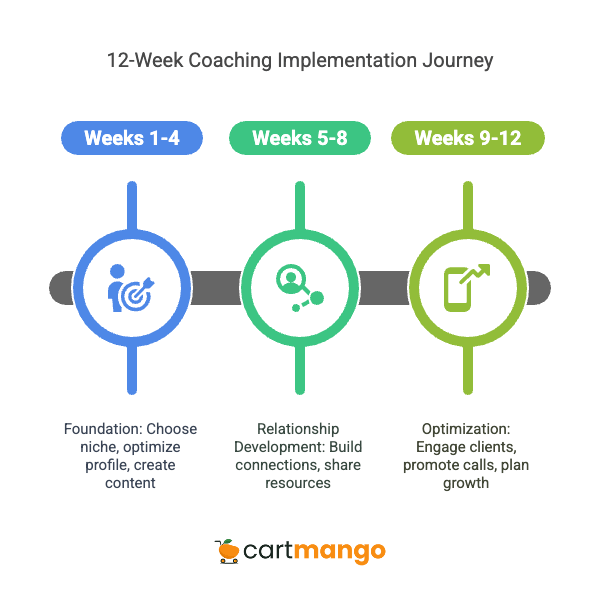
Weeks 1-4: Foundation
Choose your primary coaching niche and select one platform based on the guidance above. Optimize your profile with clear value proposition targeting your niche’s desired outcomes.
Begin using your selected content templates to create your first month of posts. Establish a realistic posting schedule you can maintain without feeling overwhelmed.
Start your daily 15-20 minute engagement routine focusing on relationship building. The first month feels like throwing spaghetti at a wall to see what sticks, and that’s completely normal.
Weeks 5-8: Relationship Development
Focus on building genuine connections with potential clients, not selling them anything yet.
Share valuable resources in conversations without expecting immediate returns.
Host your first live session addressing common pain points in your niche. Create your first simple lead magnet that solves an immediate problem.
Begin using the qualification questions to understand your audience better. This phase tests your patience more than anything else because you’re building a foundation that most people never see.
Weeks 9-12: Optimization
Double down on content types that generate the best engagement from ideal clients. Streamline your content creation process using planning tools for efficiency.
Begin soft promotion of discovery calls to your warmed audience who knows and trusts you.
Plan sustainable systems for continued growth without burning out completely. Focus on what’s working rather than trying to fix everything at once.
Realistic Success Metrics by Week 12
- Consistent posting schedule you can maintain long-term without stress or panic attacks.
- Growing engagement from your target audience who recognizes your expertise.
- 1-2 discovery call inquiries from people who found you through social media.
- Clear understanding of what content resonates most with your specific niche.
Social Media Marketing for Coaches: Your Turn
Social media marketing for coaches is a long-term relationship-building strategy, not a quick client acquisition tactic that works overnight.
Focus on providing genuine value and building authentic connections rather than immediate sales results.
The coaches who succeed on social media are those who consistently show up to serve their audience. They demonstrate their expertise through helpful content and build trust over time.
Success comes from patience, consistency, and genuine care for your audience’s success.
Perhaps the most important thing I’ve learned is this:
Your social media presence should feel like an extension of your coaching practice, not a separate marketing machine that feels fake and forced.
When you approach it with the same care and intention you bring to your coaching sessions, everything changes in ways you never expected.
Related
- Ejunkie vs Samcart: the case with the recurring revenue (2026)
- Ejunkie vs Payhip: 0 recurring revenue safety (2026)
- Ejunkie vs Gumroad: no subscriptions vs no ownership (2026)
- Gumroad vs SureCart: the “catch” (2026)
- Payhip vs SureCart: the hidden catch nobody talks about (2026)
- Sellfy vs SureCart: your recurring payments at risk (2026)
- SendOwl vs SureCart: recurring revenue you don’t own (2026)
- SamCart vs SureCart: the recurring payment problem (2026)
- ThriveCart vs SureCart: who really owns your customers? (2026)
- Sellfy vs Easy Digital Downloads: the revenue hostage (2026)
